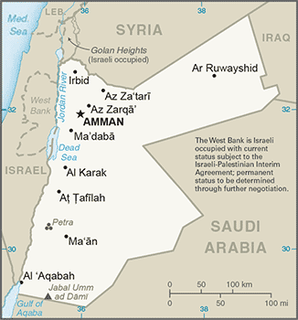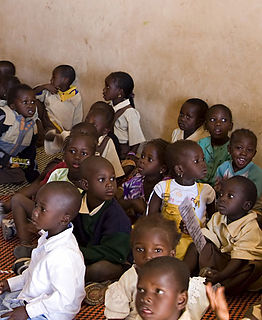Related Research Articles
Education in Greece is centralized and governed by the Ministry of Education and Religious Affairs at all grade levels. The Ministry exercises control over public schools, formulates and implements legislation, administers the budget, coordinates national level university entrance examinations, sets up the national curriculum, appoints public school teaching staff, and coordinates other services.
Education in Vietnam is a state-run system of public and private education run by the Ministry of Education and Training. It is divided into five levels: preschool, primary school, secondary school, high school, and higher education. Formal education consists of twelve years of basic education. Basic education consists of five years of primary education, four years of secondary education, and three years of high school education. The majority of basic education students are enrolled on a daily basis. The main education goal in Vietnam is "improving people's general knowledge, training quality human resources, and nurturing and fostering talent."

Mabaruma is the administrative centre for Region One (Barima-Waini) of Guyana. It is located close to the Aruka River on a narrow plateau above the surrounding rainforest at an elevation of 13 metres.

Education in Bangladesh is overseen by the country's Ministry of Education. The Ministry of Primary and Mass Education is responsible for implementing policy for primary education and state-funded schools at a local level. In Bangladesh, all citizens must undertake ten years of compulsory education which consists of five years at primary school level and five years at high school level. Primary and secondary education is financed by the state and free of charge in public schools.
Education in Pakistan is overseen by the Federal Ministry of Education and the provincial governments, whereas the federal government mostly assists in curriculum development, accreditation and in the financing of research and development. Article 25-A of Constitution of Pakistan obligates the state to provide free and compulsory quality education to children of the age group 5 to 16 years. "The State shall provide free and compulsory education to all children of the age of five to sixteen years in such a manner as may be determined by law".

Education in Sudan is free and/or compulsory for children aged 6 to 13 years. Primary education up to the 2019/2020 academic year consists of eight years, followed by three years of secondary education. The primary/secondary educational ladder of 6+3+3 years was switched in 1965 and during the Omar al-Bashir presidency to 8+3 and is scheduled, during the 2019 Sudanese transition to democracy, to return to 6+3+3 in the 2020/2021 academic year. The primary language at all levels is Arabic. Starting in the 2020/2021 academic year, English is to be taught starting at kindergarten. Schools are concentrated in urban areas; many in the South and West were damaged or destroyed by years of civil war. In 2001 the World Bank estimated that primary enrolment was 46 percent of eligible pupils and 21 percent of secondary students. Enrolment varies widely, falling below 20 percent in some provinces. Sudan has 36 government universities and 19 private universities, in which instruction is primarily in Arabic.
St. Stanislaus College is a Grade-A senior secondary school in Georgetown, Guyana. It has a student population of 500 and a teaching staff of about 40. Admission to the school is normally through the Secondary Schools' Entrance Examination. It is the third highest school in the country, following Queen's College and Bishops' High School.

Education in the Palestinian Territories refers to the educational system in the Gaza Strip and the West Bank, which is administered by the Palestinian Ministry of Education and Higher Education. Enrollment rates amongst Palestinians are relatively high by regional and global standards. According to a youth survey in 2003, 60% between the ages 10–24 indicated that education was their first priority. Youth literacy rate is 98.2%, while the national literacy rate is 91.1%. Enrollment ratios for higher education were 46.2% in 2007, among the highest in the world. In 2016 Hanan Al Hroub was awarded the Varkey Foundation Global Teacher Prize for her work in teaching children how to cope with violence.
Education in Tanzania is provided by both the public and private sectors, starting with pre-primary education, followed by primary, secondary ordinary, secondary advanced, and ideally, university level education. Free and accessible education is a human right in Tanzania. The Tanzanian government began to emphasize the importance of education shortly after its independence in 1961. Curriculum is standardized by level, and it is the basis for the national examinations. Achievement levels are important, yet there are various causes of children not receiving the education that they need, including the need to help families with work, poor accessibility, and a variety of learning disabilities. While there is a lack of resources for special needs education, Tanzania has committed to inclusive education and attention on disadvantaged learners, as pointed out in the 2006 Education Sector Review AIDE-MEMORE. The government's National Strategy for Growth and Reduction of Poverty in 2005 heavily emphasized on education and literacy.

Harrogate High School is a secondary school in Harrogate, North Yorkshire, England. It has about 600 pupils on roll and approximately 85 full-time teaching staff. The school was awarded specialist Sports College status. The Academy Head is Mark Turner.

The education system of the Hashemite Kingdom of Jordan has been improved consistently since the mid-1900s. The role played by a good education system has been significant in the development of Jordan from a predominantly agrarian to an industrialized nation. Jordan has the highest number of researchers in research and development per million people among all the 57 countries that are members of the Organisation of Islamic Cooperation (OIC). In Jordan there are 8060 researchers per million people, while the world average is 2532 per million.

Education in Guyana is provided largely by the government of Guyana, through the Ministry of Education and its arms in the ten different regions of the country. Guyana's education system is a legacy from its time as British Guiana, and is similar to that of the other anglophone member states of the Caribbean Community, which are affiliated to the Caribbean Examinations Council (CXC). School curricula, funding, standards and other policies are set by the central government and implemented through the Ministry of Education and related agencies. The Education System is divided into eleven districts, ten of which correspond to the national administrative and geographical regions of the country, while the capital, Georgetown, is treated as a separate education district. With 8.3% of its GDP spent on education, Guyana sits with Cuba, Iceland, Denmark and Botswana as among the few countries with top spending on education.
Education in Jamaica is primarily modeled on the British education system.

The Government of Yemen has made the development of education system its top priority. The share of the budget dedicated to education has remained high during the past decade, averaging between 14 and 20% of the total government expenditure and as of 2000 it is 32.8 percent. The education expenditure is 9.6 percent of GDP for the year 2001 as seen in the chart below. In the strategic vision for the next 25 years since 2000,the government has committed to bring significant changes in the education system, thereby reducing illiteracy to less than 10% by 2025. Although Yemen's government provides for universal, compulsory, free education for children ages six through 15, the more U.S. Department of State reports that compulsory attendance is not enforced. The country ranked 150 out of 177 in the 2006 Human Development Index and 121 out of 140 countries in the Gender Development Index (2006). In 2005, 81 percent of Yemen's school-age population was enrolled in primary school; enrollment of the female population was 74 percent. Then in 2005, about 46 percent of the school-age population was enrolled in secondary school, including only 30 percent of eligible females. The country is still struggling to provide the requisite infrastructure. School facilities and educational materials are of poor quality, classrooms are too few in number, and the teaching faculty is inadequate.

Education in Ethiopia was dominated by the Ethiopian Orthodox Church for many centuries until secular education was adopted in the early 1900s. Prior to 1974, Ethiopia had an estimated illiteracy rate below 50% and compared poorly with the rest of Africa in the provision of schools and universities. After the Ethiopian Revolution, emphasis was placed on increasing literacy in rural areas. Practical subjects were stressed, as was the teaching of socialism. By 2015, the literacy rate had increased to 49.1%, still poor compared to most of the rest of Africa.

The Constitution mandates free and compulsory primary education in the Gambia, but a lack of resources and education infrastructure has made implementation difficult. In 1995, the gross primary enrollment rate was 77.1 percent and the net primary enrollment rate was 64.7 percent. School fees long prevented many children from attending school, but in February 1998 the president of the Gambia ordered the termination of fees for the first six years of schooling. Girls make up about 40 percent of primary school students, though the figure is much lower in rural areas where cultural factors and poverty prevent parents from sending girls to school. Approximately 20 percent of school-age children attend Koranic schools, which usually have a restricted curriculum.

Education in Namibia is compulsory for 10 years between the ages of 6 and 16. There are approximately 1900 schools in Namibia of which 100 are privately owned. Namibian subjects' syllabi are based on the International General Certificate of Secondary Education which is part of Cambridge International. The Constitution directs the government to provide free primary education; however, families must pay fees for uniforms, stationery, books, hostels, and school improvements.
Since gaining independence from France in 1956, the government of Tunisia has focused on developing an education system which produces a solid human capital base that could respond to the changing needs of a developing nation. Sustained structural reform efforts since the early 1990s, prudent macroeconomic policies, and deeper trade integration in the global economy have created an enabling environment for growth. This environment has been conducive to attain positive achievements in the education sector which placed Tunisia ahead of countries with similar income levels, and in a good position to achieve MDGs. According to the HDI 2007, Tunisia is ranked 90 out of 182 countries and is ranked 4th in MENA region just below Israel, Lebanon, and Jordan. Education is the number one priority of the government of Tunisia, with more than 20 percent of government’s budget allocated for education in 2005/06. As of 2006 the public education expenditure as a percentage of GDP stood at 7 percent.

Anna Regina Secondary School, is a secondary school located in Anna Regina, Pomeroon-Supenaam, Essequibo Coast, Guyana.
References
- ↑ "Mabaruma residents experiencing 'the good life'". Guyana Chronicle. Retrieved 2020-12-14.
- ↑ "Region One celebrates improvements in CSEC". Department of Public Information. 2018-10-29. Retrieved 2020-12-14.
- ↑ "Students of North West Secondary School complete Entrepreneurial Training". www.education.gov.gy. Retrieved 2020-12-14.
- ↑ "Proudly representing Guyana…North West District Secondary stages Farrier's supernatural play at Caribbean Drama Festival". Kaieteur News. 2017-12-11. Retrieved 2020-12-28.